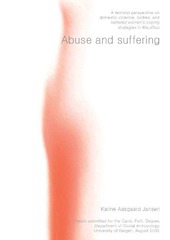| dc.description.abstract | Abuse and Suffering A feminist perspective on Domestic Violence, Bodies and Battered Women’s Coping Strategies in Mauritius. “At least one out of every three women around the world has been beaten, coerced into sex, or otherwise abused in her lifetime- with the abuser usually someone known to her. Violence against women and girls is a universal problem of epidemic proportions. Perhaps the most pervasive human rights violation that we know today, it devastates lives, fractures communities, and stalls development” (The UN). This dissertation is the result of a fieldwork conducted in a feminist oriented NGO for battered women in the small Indian Ocean island of Mauritius March to September 2003. Still, it is not the shelter per se which forms the main contents and topics of this thesis, but rather the phenomenon domestic violence as the reason for the shelter’s existence in the first place. Hence the focus of this dissertation is primarily oriented towards those women who utilise the shelter’s facilities as a refuge from violent husbands. Through the battered women’s own experiences and narratives of violence, a wider contextual and thematic field is opened up as the narratives do not only relate to the violence, but just as much portrays specific Mauritian gender patterns- and relations. In accordance with Foucauldian argumentation, the thesis argues that both normative gender structures and not the least abuse can be understood as inscribed on the surface of the women’s bodies, and embodied by them. Additionally, due to the women’s experiences with violence and pain, the thesis also argues that the women’s bodies become the centre of their interaction with the surrounding, sheltered world through the development of a somatic contextual discourse. Nevertheless, no matter how difficult the conditions for the women might be they rarely completely lack agency. By expressing both psychological and physical pain corporeally, the women can also be argued to interpret their specific situations so as to be able to handle their ‘ill fortunes’. What might appear as illness, hence passivity, can also be understood as the employment of resistance or coping strategies. All in all, this thesis concentrates on how battered Mauritian women manage their victimisation to domestic violence, and how this handling is shaped at the shelter and in interaction with the Mauritian macro context such as the state’s dealings with domestic violence. | en_US |
